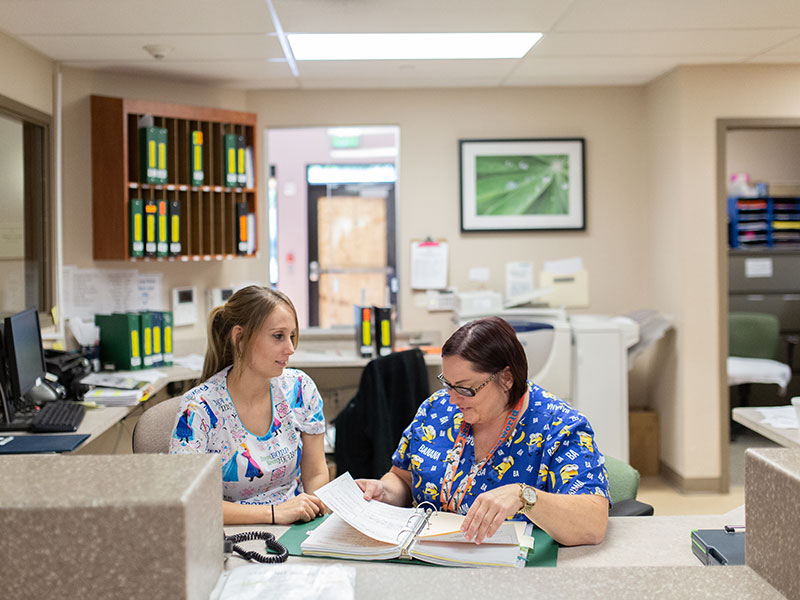Cedar Crest Hospital & Residential Treatment Center helps individuals who are struggling with opiate addiction find long-term recovery. Located in Belton, TX, Cedar Crest offers expert care for opiate addiction treatment.
Learn More About Opiate Addiction Treatment
Learn more about opiate addiction treatment at Cedar Crest Hospital in Belton, TX
While most people who are prescribed central nervous system depressant analgesics do not have a problem using them the way in which they were prescribed, some people may be drawn to the feelings of euphoria and overall wellbeing these drugs create. Opiate abuse is when an individual uses these narcotics for non-medical purposes in a way not intended by the prescribing doctor. People who abuse prescription opiates run the risk of very serious health complications and increasing interpersonal problems. While addiction can slowly take over a person’s life, with the proper detox, rehab, and support addicts can successfully recover and go on to lead happy, productive, and sober lives.
Cedar Crest, a hospital for opiate addiction in Belton, has helped countless men, women, children, teens, and older adults find the strength within them to break the cycle of addiction. Our highly qualified, compassionate staff has successfully helped many individuals get clean and learn to live a life of sobriety. If your life has slowly been spiraling out of control due to your inability to get through the day without using opiates, pick up the phone and call us today. Together we can develop a plan that will help you get your life back and allow for a bright future.
How to Help a Loved One
Helping a loved one get treatment for opiate addiction
If you have a loved one who is struggling with an opiate addiction it can be hard to know what, if anything, you can do to help them. While you cannot force someone into treatment, there are some things you can do to help them make the decision to seek rehab. Here are some tips that can aid in getting someone you love into treatment for their opiate addiction.
- Provide support and loving care
- Be direct and honest
- Don’t support the addict in their denial
- Take the time to understand and accept they have a disease
- Look into treatment options for your loved one
- Set boundaries and limits
- Get help for yourself
It is also important to remember that you did not cause the addiction, you cannot control it, and that you cannot cure it. If your loved one decides to enter treatment you, should know that this is only the start to a long journey. Recovering from an addiction is going to take a lot of time and effort. Be there to support your loved one throughout the whole process; an effective support network is going to help your loved one stay on their recovery path.
Why Consider Treatment
Why consider treatment for opiate addiction at Cedar Crest Hospital & Residential Treatment Center in Belton, TX
An opiate addiction can cause multifaceted intrusions in an abuser’s life, creating difficulties in both the short and long term. While physical consequences are usually the most obvious, the effects of an opiate addiction do not stop there. An individual who abuses opiates will face destruction physically, psychologically, and socially. Prolonged opiate abuse will stop the body from functioning normally as the organs and other systems are slowly destroyed. Mental health will also begin to decline causing an individual to have a distorted perception of reality and extreme behavior changes. Finally, opiate abuse can cause an individual to withdraw from family and friends, being socially isolated.
An inpatient treatment center is a great place to start working on your recovery from opiate addiction. Having the help of professional mental health and substance abuse experts can allow for you to get the best care and treatment, as they give you the tools needed to overcome the addiction. An addiction program is the ideal place for rehab because it allows you to escape the stressors associated with daily life and avoid triggers that may cause you to use. Individual therapy, group sessions, family therapy, and experiential treatment are all designed to help patients learn healthier coping skills and life skills so that they can get their life back.
Our Philosophy
Cedar Crest Hospital & Residential Treatment Center philosophy and treatment benefits
Cedar Crest, a treatment center for opiate abuse in Belton, has been helping people successfully recover from substance addiction and mental illness for over 30 years. Our wonderful staff has the experience and knowledge to help all children, teens, adults, older adults, and military personnel. Our serene campus is the perfect place for an individuals to begin their recovery journey. At our opiate addiction treatment center, our main goal is to help all patients reach their maximum potential, allowing them to once again be fully functioning members of society. We focus on individual strengths, making sure to build people up so that they can once again be happy and successful in life.
Types of Treatment
Types of opiate addiction treatment offered at Cedar Crest Hospital & Residential Treatment Center in Belton, TX
The treatment approach at our hospital for opiate addiction teaches our patients that in order to grow as an individual, treatment must include developing healthy expression of emotions, community involvement, teamwork, openness to alternative viewpoints, and accountability for one’s own actions. Upon arrival you will meet with one of our intake counselors who will complete a series of assessments in order to determine your current needs and answer any questions you may have. Information gathered in the assessments will be used to develop your treatment plan.
Medication may be used at the beginning of your treatment at our hospital in order to help relieve some of the symptoms of opiate withdrawal, allowing you to more fully engage in other therapeutic aspects. These meds are tapered down once the withdrawal has subsided and may be eliminated altogether once better coping skills have been learned. Other individuals may need long-term medication in order to treat the existence of any co-occurring disorders. Medication will be closely monitored by your treatment team and adjusted as needed.
Individual therapy at our treatment center can help you unearth the reasons behind your addiction and what may have caused you to start abusing opiates in the first place. Additionally, by addressing the negative ways in which you view the world, you can learn to make healthier choices and behave more appropriately. We will also take the time to work through identifying potential triggers to help prevent relapse and how to cope with them when they arise.
Group therapy is the main form of treatment we employ here at our opiate abuse treatment center. Together you and your group members can work on learning better coping mechanisms, social skills, how to identify relapse triggers, and how to support each other throughout the whole process. Groups are held multiple times a day and topics may include anger management, importance of adherence to your treatment plan, and coping with triggers.
Family therapy at our hospital can help you and your loved ones begin to mend any bonds that may have been broken because of your addiction to opiates. Addiction is a family disease and as such we will take the time to educate your loved ones about addiction, the recovery process, and ways that they can be most supportive to you. We will also provide time for your loved ones to share the ways in which your addiction has affected their life and give any references needed for additional support.
In addition to standard therapies, we offer a variety of experiential methods designed to complement our other therapeutic interventions. Experiential methods may include:
- Yoga
- Recreational therapy
- Art therapy
- Music therapy
- Swimming pool
Continuing Care
Continuing care and levels of treatment for opiate addiction
At our hospital for opiate addiction in Belton, TX, we have different levels of care we provide for those individuals who are in need of mental health and substance abuse treatment. When discharge time comes, you and your loved ones will work with your treatment team to create a plan of care that meets your continuing needs. On the day of discharge, you will meet with each member of your treatment team to make sure everything is in place so the transition process is as smooth as possible.
You may decide that stepping down to residential or sober living treatment, which allows you to continue your recovery in a less restrictive environment, is the best choice for you at the time. Other people may opt to step down into a partial hospitalization program (PHP) or an intensive outpatient program (IOP). PHP and IOP both allow you to focus on your recovery during the day and slowly reintegrate into your community. Finally, some may believe they have made enough progress that they are ready to be discharge home with referrals to our traditional outpatient therapy clinic. Whatever you decide, at our opiate abuse treatment center, we are here to support you.

















